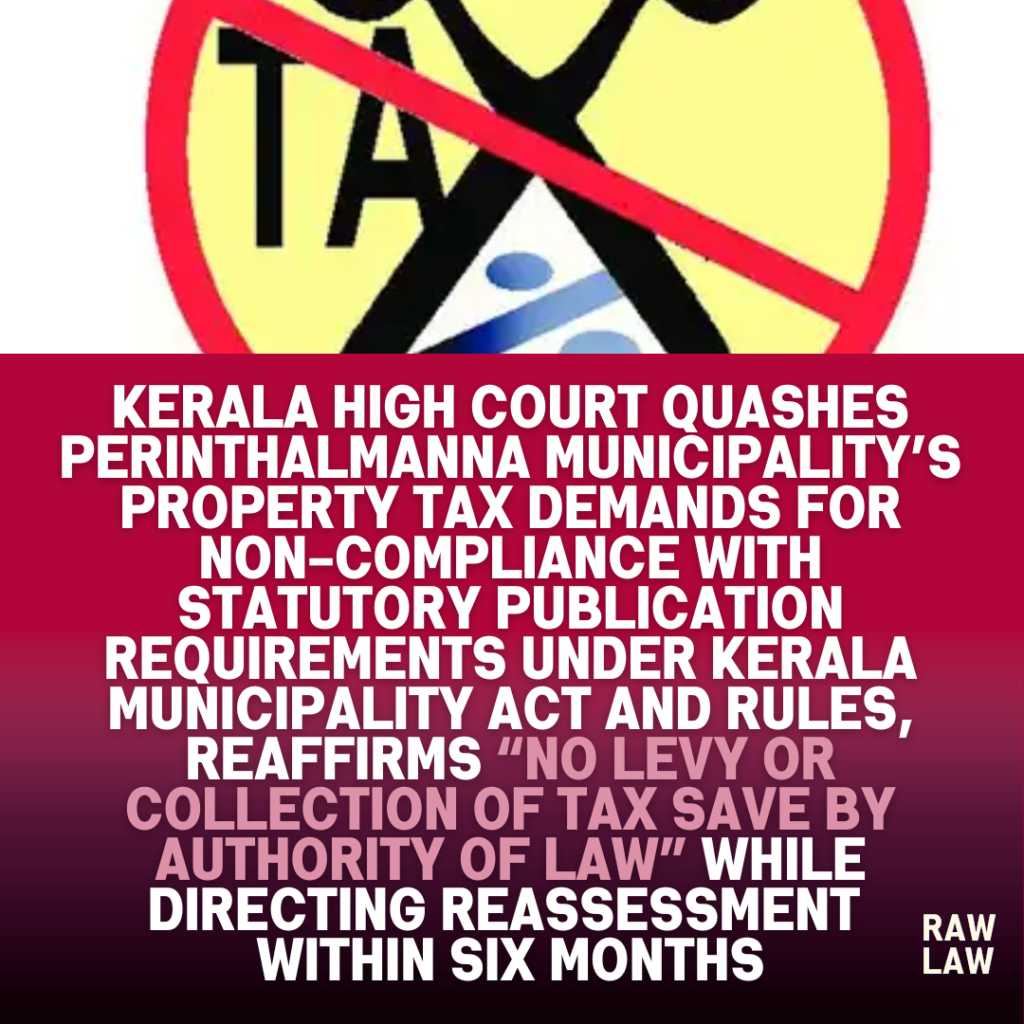Court’s Decision
The Kerala High Court dismissed a batch of writ appeals filed by the Perinthalmanna Municipality challenging a Single Judge’s order quashing property tax demand notices issued without following mandatory procedures under the Kerala Municipality Act, 1994, and the Kerala Municipality (Property Tax, Service Cess and Surcharge) Rules, 2011. The Court upheld the direction to quash the demand notices, requiring the Municipality to re-initiate the process strictly following statutory requirements within six months, reiterating that tax levies must satisfy the mandate of Article 265 of the Constitution.
Facts
Perinthalmanna Municipality had issued demand notices for arrears of property tax to multiple property owners. The property owners challenged these notices, contending that the Municipality did not follow the statutory procedures under Section 233 of the Kerala Municipality Act and Rules 4 and 10 of the 2011 Rules before issuing demands. The Single Judge found procedural lapses and quashed the demands while allowing the Municipality to reinitiate proceedings in compliance with the law within six months. The Municipality filed writ appeals contending substantial compliance with procedures and argued that an appellate remedy under Rule 16(4) existed for aggrieved parties.
Issues
- Whether the Municipality complied with mandatory statutory procedures under the Kerala Municipality Act and the 2011 Rules while issuing property tax demand notices.
- Whether non-compliance with the procedure under Rules 4(4) and 10 rendered the demand notices void.
- Whether the existence of an appellate remedy under Rule 16(4) barred writ jurisdiction.
Petitioner’s Arguments
The Municipality argued that it had substantially complied with Rule 4(2) procedures and that any non-compliance with Rule 10 was procedural, which could be rectified by providing the petitioners a fresh opportunity to submit voluntary returns. It contended that the writ petitions were not maintainable due to the existence of an alternative appellate remedy under Rule 16(4) and that the Single Judge erred in quashing the assessments outright.
Respondent’s Arguments
The property owners argued that the demand notices and assessments were void ab initio since the Municipality failed to publish notifications under Rule 4(4) and did not issue mandatory public notices under Rule 10 demanding submission of property tax returns. They submitted that without adherence to these procedures, no lawful levy could exist under Article 265 of the Constitution, rendering the demands unconstitutional.
Analysis of the Law
The Court analysed the principles under Article 265 requiring levy and collection of tax only with the authority of law, reading these with the procedural safeguards under Article 243X and the Kerala Municipality Act and Rules. It referred to the requirement under Govind Saran Ganga Saran v. CST (1985 Supp SCC 205), which held that all essential components of a tax levy must be clearly ascertainable, failing which the levy is void.
Precedent Analysis
The Court relied on:
- Govind Saran Ganga Saran v. CST (1985 Supp SCC 205), which outlined the essential components of a valid tax levy.
- Its own decision in W.A. No. 986 of 2025, affirming that the publication requirements under Rule 4 are mandatory and not directory.
- Constitutional principles under Article 265 read with Article 243X ensuring non-arbitrary tax collection.
Court’s Reasoning
The Court held that compliance with Rules 4 and 10 is mandatory, forming part of the authority of law under Article 265. It found that the Municipality did not publish the final rates of basic property tax in the manner required under Rule 4(4) nor did it issue the mandatory public notice under Rule 10 for property owners to submit returns, rendering the levy and demand notices void. It noted that the existence of an appellate remedy under Rule 16(4) does not preclude writ jurisdiction when the very foundation of the levy is absent.
Conclusion
The High Court upheld the Single Judge’s decision, dismissing the writ appeals, quashing the demand notices, and directing the Municipality to reinitiate the assessment process in compliance with statutory requirements within six months.
Implications
- Reinforces the principle that tax levies and collections must strictly adhere to statutory procedures under Article 265.
- Establishes that publication requirements under Rules 4 and 10 are mandatory conditions precedent for property tax assessments.
- Affirms that municipalities cannot bypass procedural safeguards even with alternative appellate remedies available.
Cases Referred and Their Relevance
- Govind Saran Ganga Saran v. CST (1985 Supp SCC 205): Held that certainty in tax levy is essential; ambiguity invalidates the levy.
- W.A. No. 986 of 2025: Kerala High Court affirmed mandatory nature of publication requirements under Rule 4 before levy.
- Reference to Article 265 and Article 243X of the Constitution underscoring that tax levies require authority of law and must be fair, reasonable, and non-arbitrary.
FAQs
Q1: Can a municipality demand property tax without issuing statutory notifications under Rule 4 and Rule 10?
No, the Kerala High Court has ruled that such demands are void if these mandatory procedures are not followed.
Q2: Is an appellate remedy a bar to challenging property tax demands in writ jurisdiction?
No, where the levy itself is invalid for want of statutory compliance, writ petitions are maintainable.
Q3: What is the effect of non-compliance with statutory procedures in tax collection?
Non-compliance renders the tax levy and collection unconstitutional under Article 265, invalidating the demand.



